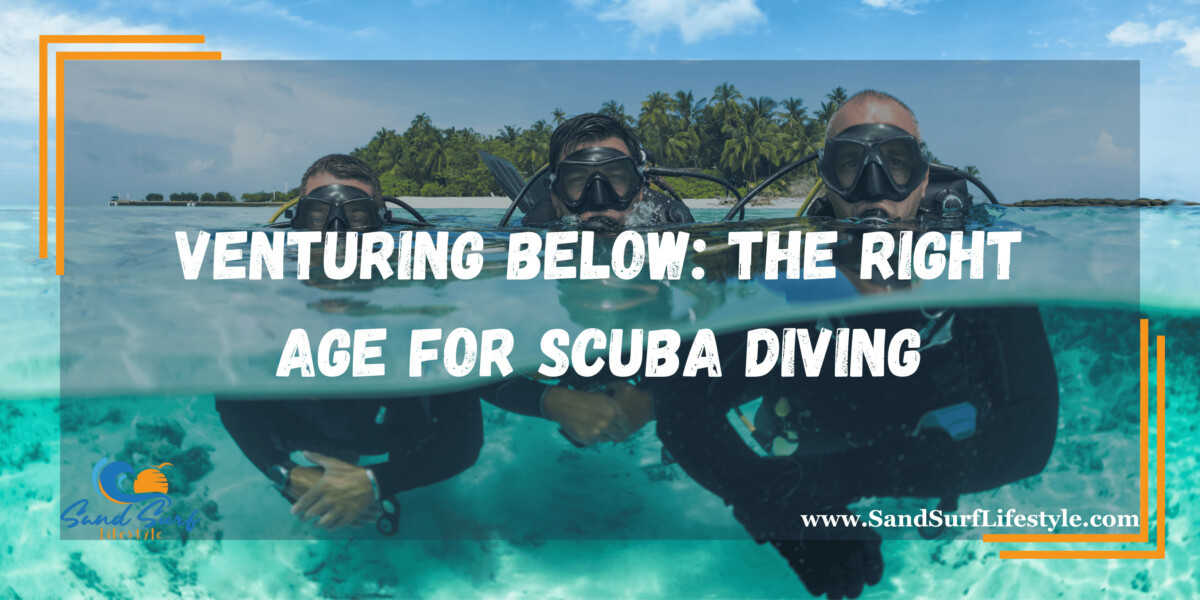Diving into the world beneath the waves is a thrilling adventure that appeals to people of all ages. If you’ve ever wondered when the right time is to embark on your scuba diving journey, you’re in the right place.
Starting Young: From Eight Years Old

The allure of underwater exploration is a captivating journey that transcends age boundaries, as scuba diving extends a warm welcome to enthusiasts as young as eight years old. The remarkable aspect of scuba diving is its inclusivity, offering the opportunity for individuals to immerse themselves in the wonders of the aquatic world from a tender age.
While the enthusiasm of young divers is commendable, it’s crucial for them to embark on their scuba diving journey through age-appropriate programs that prioritize their safety and overall enjoyment. These specialized programs are meticulously designed to accommodate the unique needs and capabilities of young divers. By incorporating a balance between education, skill development, and leisure, these introductory programs lay a solid foundation for young divers, enabling them to grasp the fundamental principles of diving while fostering a sense of excitement and wonder.
The significance of these initial experiences cannot be understated, as they serve as stepping stones towards more advanced diving exploits as young divers progress through the years. The acquired skills and knowledge gradually transform them into confident and capable divers, ready to explore deeper waters and encounter a wider array of marine life.
These formative years of scuba diving not only build practical competence but also instill a deep appreciation for the underwater world and the need to protect it. The lessons learned during these early stages foster a sense of responsibility and awareness, ensuring that the next generation of divers becomes stewards of the oceans.
The appeal of underwater exploration knows no age limit, and scuba diving embraces the curiosity and courage of even the youngest enthusiasts. Through carefully crafted programs that prioritize safety and engagement, these budding divers are poised to embark on an incredible journey that will accompany them through their growth into skilled and environmentally conscious divers.
To learn more about how age factors into scuba diving adventures, check out this article.
Safety First: Ages 10-14
The transitional phase between ages 10 and 14 opens a gateway for budding divers to delve further into their underwater journey by enrolling in Junior Open Water Diver courses. These specialized programs are carefully curated to provide a comprehensive foundation in scuba diving, all within a controlled and closely supervised environment.
Recognizing the unique needs and sensitivities of young participants, these courses place an unwavering emphasis on safety. Instructors are attuned to the developmental nuances of this age group, tailoring their guidance to create an environment where learning is both enriching and secure. This approach ensures that these young divers can absorb the intricacies of scuba diving with confidence and without apprehension.
The core objectives of Junior Open Water Diver courses extend beyond simply introducing young enthusiasts to scuba diving. Rather, they are structured to instill proper techniques from the outset, equipping participants with skills that not only foster a sense of accomplishment but also lay a solid foundation for future diving pursuits. Confidence burgeons as they master essential maneuvers, ensuring that they can navigate underwater landscapes with ease.
However, the curriculum of these courses transcends mere mechanics. Responsible diving practices are ingrained within the fabric of instruction, nurturing an understanding of the delicate balance that exists beneath the waves. Young divers are sensitized to the importance of respecting marine life and preserving fragile ecosystems. This nurturing of environmental consciousness at an early age ensures that these divers emerge not only as adept underwater explorers but also as guardians of the underwater world.
The Junior Open Water Diver courses act as a bridge between curiosity and competence, between youthful exuberance and responsible exploration. By infusing education with safety, technique with ethics, these courses lay a solid cornerstone for the young divers’ journey, ensuring that their undersea encounters are not only memorable but also meaningful.
Growing Independence: Ages 15-17
As teenagers journey into the age bracket of 15 to 17, a new realm of possibilities unfolds before them in the world of scuba diving. This phase marks a significant milestone as they are presented with the option to pursue Open Water Diver certification – a definitive step towards more autonomous underwater exploration.
With this transition, young divers are poised to expand their horizons and explore a diverse range of underwater environments. The guidance of a certified instructor continues to be a cornerstone of this phase, providing an invaluable safety net as they venture into deeper waters and more varied aquatic landscapes. This supervision ensures that their exploration is both secure and educational, allowing them to absorb the complexities of the underwater world with guided confidence.
The comprehensive training associated with Open Water Diver certification is pivotal. It empowers teenagers with a robust set of skills, empowering them to navigate underwater realms with precision and clarity. Effective communication techniques are honed, facilitating seamless interaction with fellow divers and enhancing safety measures. Moreover, the training equips them with the tools to respond effectively to potential challenges that may arise during their dives, instilling a sense of preparedness and adaptability.
This stage represents an exhilarating period where the thrill of underwater discovery harmoniously intertwines with increased responsibility. As young divers delve into more independent diving experiences, they become custodians of their own journeys, each plunge into the depths cultivating a deeper sense of ownership over their exploration. This transition not only fuels their passion for diving but also nurtures skills that extend beyond the aquatic realm, fostering qualities of discipline, decision-making, and self-reliance.
The transition to Open Water Diver certification marks a transformative juncture for teenage divers. It’s a time of expansion, growth, and enrichment as they embrace both the freedom of underwater exploration and the heightened responsibility that accompanies it. Through comprehensive training and supervised adventures, this phase acts as a bridge between youth and adulthood, sowing the seeds for a lifetime of conscientious and exhilarating underwater journeys.
Adulthood and Beyond: 18 and Above

Reaching the age of 18 marks a significant milestone in the world of scuba diving, as divers are officially recognized as adults by most scuba organizations. This transition ushers in a world of opportunities, granting them access to a diverse spectrum of scuba diving programs that cater to their evolving interests and aspirations.
Adult divers, now equipped with the autonomy to choose from a full range of scuba offerings, can tailor their underwater experiences to match their passions. From recreational dives that offer moments of tranquility and marvel in the underwater realm to specialized courses that delve into advanced diving techniques and unique specialties, the options are abundant. This phase of diving empowers them to further refine their skills, delve deeper into their interests, and expand their horizons.
One of the distinct attributes of adulthood is a deeper appreciation for the marine world. Adult divers, having accrued years of life experience, embark on journeys that offer more than just adventure. They become attuned to the delicate balance of marine ecosystems, fostering a sense of responsibility and stewardship. With this awareness, they actively contribute to environmental conservation through initiatives like underwater cleanup and reef monitoring. These activities transcend the act of diving itself, transforming it into a platform for actively preserving and nurturing the underwater habitats they so deeply cherish.
The age of 18 signifies not only a legal transition but also an emotional and intellectual one. It’s a time when divers can immerse themselves in a tapestry of experiences that cater to their newfound maturity. With a spectrum of diving possibilities at their fingertips, they stand poised to explore, learn, and engage, enriching their lives while simultaneously enriching the underwater world they hold dear.
The Role of Experience
Age alone isn’t the sole litmus test of a diver’s readiness; experience is a pivotal factor that shapes one’s proficiency beneath the waves. A young diver who embarks on the journey early and accumulates years of underwater exploration can manifest an impressive level of expertise long before they reach adulthood. Their years of practice, encounters, and challenges sculpt a depth of understanding that transcends their age. These seasoned young divers often possess insights and skills that belie their years, demonstrating the transformative power of experience.
Conversely, adult beginners enter the underwater realm with a distinct advantage – a foundation of life experience. Their capacity to learn, adapt, and apply newfound knowledge can propel them quickly along the path of proficiency. With focused training and dedicated practice, they can swiftly bridge any skill gap that age might initially suggest. The determination to excel and the willingness to immerse themselves in the learning process enable them to catch up with their younger counterparts in terms of skills and self-assurance.
Factors to Consider
While age is a pivotal factor in scuba diving readiness, it’s part of a larger equation that encompasses various considerations. Physical fitness is a key determinant; being in good health enhances safety and overall enjoyment. Health conditions that may not necessarily hinder daily life might impact diving suitability, necessitating medical assessments to ensure compatibility with the activity.
Comfort in the water is equally significant. A strong swimming background contributes to ease of movement and buoyancy control, regardless of age. Those accustomed to aquatic environments tend to adapt more readily to the underwater experience, making it an enjoyable journey for all involved.
For more information about the age requirements for scuba diving adventures, check out this article.
Conclusion
Scuba diving knows no age boundaries. From the eager eight-year-old embarking on their first underwater adventure to the seasoned adult explorer uncovering the mysteries of the deep, every stage of life offers unique opportunities for underwater discovery. With the right training, safety measures, and a love for the marine world, individuals of all ages can immerse themselves in the captivating realm that lies beneath the surface of our oceans. So, whether you’re young or young at heart, the age at which you can scuba dive is merely a number – the real limit is your passion for exploration and the wonders that await beneath the waves.
Please note that the contents of this blog are for informational and entertainment purposes only and should not be construed as legal advice. Any action taken based on the information provided in this blog is solely at your own risk. Additionally, all images used in this blog are generated under the CC0 license of Creative Commons, which means they are free to use for any purpose without attribution.

